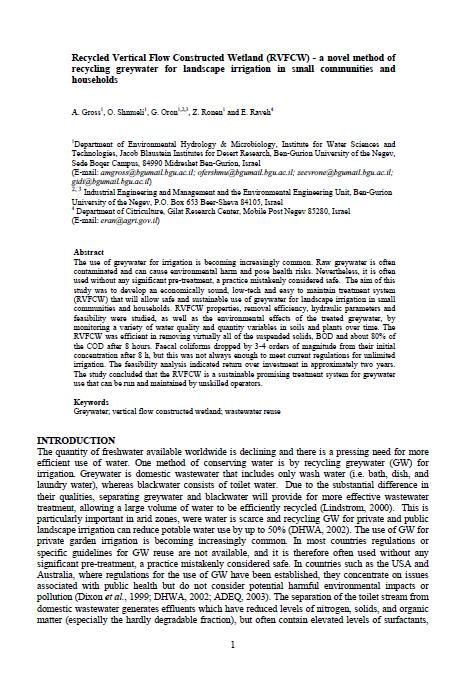Recycled Vertical Flow Constructed Wetland (RVFCW) - A novel method of recycling greywater for landscape irrigation in small communities and households
Gross, A. et al. (2007)

Published in: 2007
Author:
Gross, A. et al.
Uploaded by:
SuSanA secretariat
Partner profile:
common upload
5135 Views
107 Downloads
Content - Summary
The use of greywater for irrigation is becoming increasingly common. Raw greywater is often contaminated and can cause environmental harm and pose health risks. Nevertheless, it is often used without any significant pre-treatment, a practice mistakenly considered safe. The aim of this study was to develop an economically sound, low-tech and easy to maintain treatment system (RVFCW) that will allow safe and sustainable use of greywater for landscape irrigation in small communities and households. RVFCW properties, removal efficiency, hydraulic parameters and feasibility were studied, as well as the environmental effects of the treated greywater, by monitoring a variety of water quality and quantity variables in soils and plants over time. The RVFCW was efficient in removing virtually all of the suspended solids, BOD and about 80% of the COD after 8 hours. Faecal coliforms dropped by 3-4 orders of magnitude from their initial concentration after 8 h, but this was not always enough to meet current regulations for unlimited irrigation. The feasibility analysis indicated return over investment in approximately two years. The study concluded that the RVFCW is a sustainable promising treatment system for greywater use that can be run and maintained by unskilled operators.
Additional information
Published in Chemosphere 66 (5), pp. 916-923
Bibliographic information
Gross, A. et al. (2007). Recycled Vertical Flow Constructed Wetland (RVFCW) - A novel method of recycling greywater for landscape irrigation in small communities and households.
Filter tags
Constructed wetlands English














